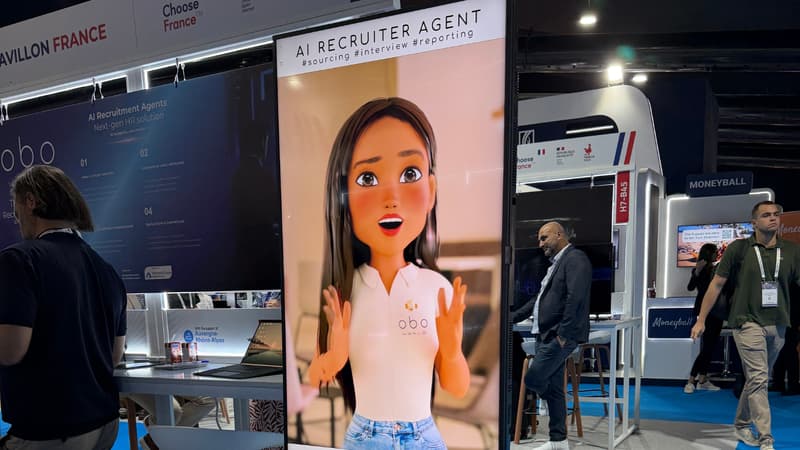The hiring of future employees does not escape AI, which is definitely capable of adapting to all needs. At Gitex in Dubai, the start-up Obo World presents Obo, an avatar capable of classifying, searching and selecting the best candidates for a position before granting them a “pre-interview”.
Don’t worry, it is not an AI that will decide your future within the company. “We do not seek to replace humans, but to help them,” insists Sonia Reis-Masclez, co-founder of Obo World. This AI is designed more like an HR assistant. Because the final decision will still be the responsibility of a real hiring manager or a real recruiter.
“Save up to 80% of time in hiring”
Obo aims to be a solution that should save recruiters “up to 80% of the time spent in the pre-selection phase.” Because this lost time is that of classifying, reading and selecting the applications, but also that of the first interviews. Obo World wants to entrust this to its AI designed “100% internally and without any other brick.” A former recruitment company transformed into a human resources technology start-up thus addressed this “very specific problem of the colossal loss of time linked to the manual classification of resumes.”
“After 20 or 30 CV we can’t take it anymore!” he summarizes. “And often, good candidates don’t even respond or aren’t on the list.” Therefore, it will be up to the AI to find the rare gems requested by customers. Therefore, it will search for CVs published on Linkedin, Jobboards and other sites, as well as those received by companies, it will read them in any format (text, photography, PDF, etc.), analyze them and identify those that correspond to the searched criteria.
Obo World’s solution comes in the form of a SaaS subscription platform, “like Netflix,” jokes Sonia Reis-Masclez. Half joking, because the operation of the web interface is also intended to be simple and quick to implement. Coming from the legal, contracting and technology sectors, the three co-founders (Sonia Reis-Masclez, Alexandre Mazel and Mathieu Masclez) have the merit of knowing the sector well, its problems and possible solutions, but also its demands. “We do everything possible to comply with the GDPR and the AI Law, because we process sensitive personal data,” he specifies.
Clients will indicate their profile requests (skills, sectors, languages spoken, salaries, etc.). Within two to three minutes, the AI provides an initial list of relevant profiles, ranked with a compatibility score. Recruiters can then activate an automated pre-qualification interview and the AI will email the candidate with a link to have a short virtual interview with Obo, a more humanized avatar. Advantage for the candidate, it is available 24 hours a day, 7 days a week.
This interview will also follow a scenario defined with the recruiter based on the position you are targeting and is presented in the form of questions with options. “We are not looking for the same profile for a luxury hotel as for a fair hostess. It is often a role play to identify the candidate’s reflexes,” explains the co-founder.
Ultimately, Obo World hopes to implement an AI conversational agent that can communicate more naturally with the candidate. But European regulations still do not make all this possible and, in the meantime, the model will be tested in other places, in the Middle East or in the United States.
Operation as fast and easy as Netflix
According to Obo World, AI also aims to be a “more inclusive” recruiter. “The AI does not judge whether it likes a candidate or not. It just does what it is told,” he insists. “By precisely formulating the criteria, the tool will limit biases related to age, gender or origin.” Unless, as always, the client enters them… Because it is not about the AI completing the process. “Recruiters can finally focus on what matters: human interviews, exchanges, personality,” adds the former lawyer.
Obo World’s first clients are both companies and recruitment companies. Pilot tests are being carried out in the hospitality, restaurant and retail sectors, sectors with high staff turnover and where recruitment is increasingly difficult.
Obo World thus hopes to reconcile human resources with technology, but it is not about making hiring a question of technology and sacrificing equity or human contact. “AI must return time to humans, but not replace them,” concludes Sonia Reis-Masclez. A promise that may resonate with overwhelmed recruiters. And who could very well reorganize the cards in a sector where every minute counts.
Source: BFM TV


